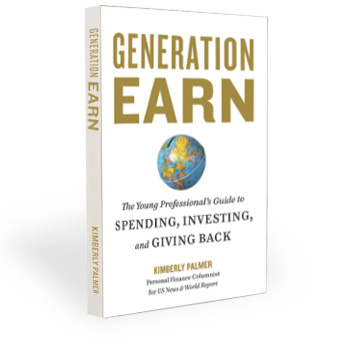 Read Published Article
Read Published Article
 Kimberly Palmer, author of Generation Earn: The Young Professional’s Guide to Spending, Investing, and Giving Back, is not buying into the notion that she and her cohorts are slackers destined to wallow in debt
Kimberly Palmer, author of Generation Earn: The Young Professional’s Guide to Spending, Investing, and Giving Back, is not buying into the notion that she and her cohorts are slackers destined to wallow in debt
The senior editor and personal finance columnist for U.S. News & World Report admits that the term “Generation Debt” has gotten some traction, and there is some truth to it.
Two out of three college students now take out college loans, compared with fewer than half in 1993, and the typical graduate sets sail owing $22,700, she writes. When it comes to credit card debt, 25- to 34-year-olds carry an average debt of over $4,000 per person, up 50% since 1989.
“But most of us are not letting our debts define us,” Palmer preaches. “While student loan burdens are heavier than they were in generations passed, more of us have college and advanced degrees that give us greater earnings power.”
If you’ve graduated from college recently and are setting off on your new career path this fall, or know someone who fits the bill, this book is certainly one that will come in handy. Most of the personal-finance bases are covered, and it’s chockablock with resources from websites to other books to go to for more in-depth guidance.
Palmer’s primary audience is the 20-to-30-something generation grappling with money matters for the first time, embarking on a career, marriage and babies. She offers tried-and-true tips on getting your credit score up, choosing a credit card, preparing financially for marriage, and investing.
It helps that she’s one with her audience. Palmer not only packs her chapters with stories and advice culled from personal-finance experts and regular folks, she includes herself in the here’s-how-to-walk-the-walk advice.
She reveals her own budgeting process, gives readers a snapshot of the negotiations she and her hubby, Sujay, had when he wanted to buy a flat-screen TV and describes her plucky bargaining by phone for a room at a spa resort getaway on the Chesapeake Bay. She nailed the rate she wanted, about half of the $300 a night advertised online.
She discusses how as soon-to-be first-time parents just a short time ago, they grappled with moving to bigger quarters but found ways to fit a new person into their one-bedroom apartment and make use of a closet full of second-hand baby clothes and a hand-me-down crib.
Palmer divides her advice into three sections: Building Your Life, Creating a Home and Changing the World. Building Your Life, for example, delves into how to create a spending plan. Make a list of your big financial goals with an estimated time frame of achieving them. Keep a spending diary for two weeks, and so forth.
Palmer is not the first one to coin some of this standard how-to material, but for neophytes, she brings a fresh voice and sane, sometimes contrarian, take-away advice. Here are her parameters for an after-tax spending plan:
•The basics, food, housing, and transportation: 50% of your budget.
•Debt payments: Less than 5%. Pay off all but your cheapest student loans early. Student loans that carry a 5% or 6% interest rate (or higher) are costing you much more than your savings can earn in our current low-rate environment.
•Savings: 25%. Don’t wait to open up a 401(k) account if your workplace offers it, even if you contribute just 2% of your salary. Soon, you can raise that to 4%, and eventually to 10% or higher.
•Professional expenses: Less than 5%. There’s one area where it’s OK to be a spendaholic, and that’s when it comes to investing in your future earning power. The category includes not only education expenses, but also voice lessons for an aspiring podcaster, and how-to books for those with potentially lucrative hobbies. Even hiring a maid service is an investment if you use the time it creates to work on your writing or website.
•Household expenses: Less than 5%.
•Entertainment: 5%.
These categories add up to less than 100% to allow for some wiggle room, she points out.
She strongly advocates earning money outside your regular paycheck, such as getting paid to talk or teach, selling crafty items online, even starting a small business on the side. She calls it “multistreaming.” In other words, “more money, fewer problems.” It’s a “self-protection device against an unpredictable labor market,” she writes.
She drills home the importance of negotiating salaries, especially asking for more money early in one’s career. It can mean a difference of half a million dollars over one’s lifetime, she explains.
Hannon is a freelancer writer based in Washington, D.C. Her website is www.kerryhannon.com


